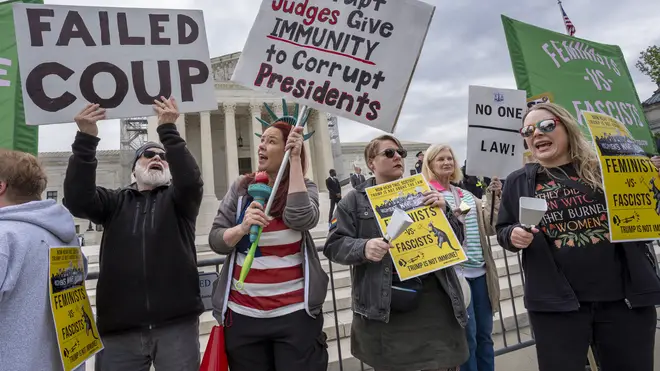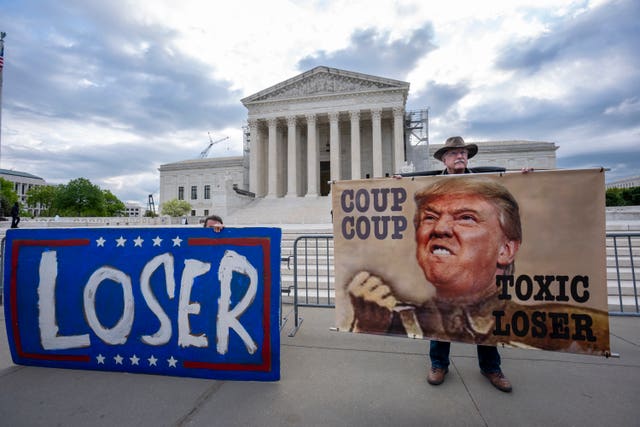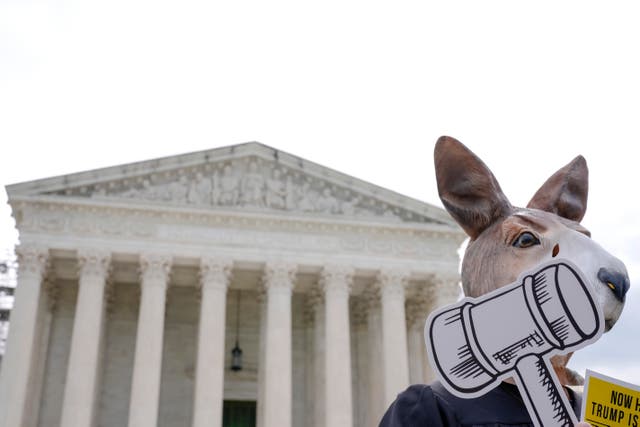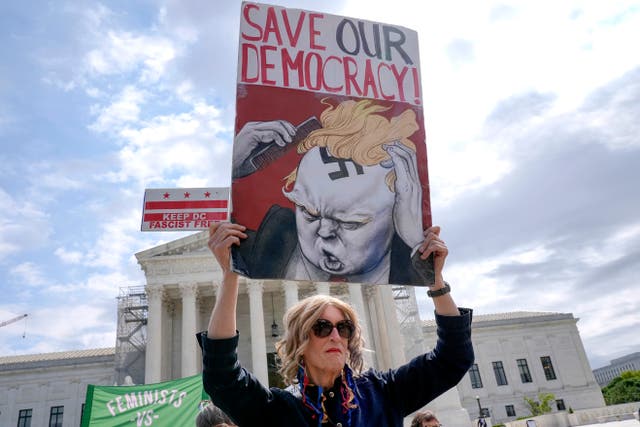
Matt Frei 10am - 12pm
25 April 2024, 18:34

Donald Trump, the presumptive 2024 Republican presidential nominee, has been pushing to delay the trial until after the election.
The US Supreme Court on Thursday appeared likely to reject former president Donald Trump’s claim of absolute immunity from prosecution over election interference, but it seemed possible he could still benefit from a lengthy trial delay, possibly beyond November’s election.
Chief Justice John Roberts was among at least five members of the court who did not appear to embrace the claim of absolute immunity that would stop special counsel Jack Smith’s prosecution of Trump on charges he conspired to overturn his 2020 election loss to Democrat Joe Biden.
But in arguments lasting more than two and a half hours hours in the court’s first consideration of criminal charges against a former president, Mr Roberts also was among several justices who suggested that the case might have to be sent back to lower courts before any trial could begin.
He indicated he was unhappy with the reasoning adopted by the federal appeals court that ruled against Trump.

The timing of the Supreme Court’s decision could be as important as the outcome.
Trump, the presumptive 2024 Republican presidential nominee, has been pushing to delay the trial until after the election, and the later the justices issue their decision, the more likely he is to succeed.
The active questioning of all nine justices left the strong impression that the court was not headed for the sort of speedy, consensus decision that would allow a trial to begin quickly.
Justices Neil Gorsuch and Brett Kavanaugh, two of Trump’s three high court appointees, suggested that former presidents might have some immunity and that in this case, lower courts might have to sort out whether that applied to Trump. That could further delay a trial.
Justice Amy Coney Barrett, the other Trump appointee, seemed less open to arguments advanced by Trump lawyer D. John Sauer.
Mr Smith’s team is asking for a speedy resolution. The court typically issues its last opinions by the end of June, about four months before the election.

Trump, the first former president charged with crimes, had said he wanted to be at the Supreme Court on Thursday.
Instead, he was in a courtroom in New York, where he is standing trial on charges that he falsified business records to keep damaging information from voters when he directed hush money payments to a former porn star to keep quiet her claims that they had a sexual encounter.
Trump’s lawyers argue that former presidents are entitled to absolute immunity for their official acts.
Otherwise, they say, politically motivated prosecutions of former occupants of the Oval Office would become routine and presidents could not function as the commander in chief if they had to worry about criminal charges.
Lower courts have rejected those arguments, including a unanimous three-judge panel on an appeals court in Washington, DC.
The election interference conspiracy case brought by Mr Smith in Washington is just one of four criminal cases confronting Trump.

Mr Smith’s team says the men who wrote the constitution never intended for presidents to be above the law and that, in any event, the acts Trump is charged with, including taking part in a scheme to enlist fake electors in battleground states won by Joe Biden, are not in any way part of a president’s official duties.
Nearly four years ago, all nine justices rejected Trump’s claim of absolute immunity from a district attorney’s subpoena for his financial records.
That case played out during Trump’s presidency and involved a criminal investigation, but no charges.
Justice Clarence Thomas, who would have prevented the enforcement of the subpoena because of Trump’s responsibilities as president, still rejected Trump’s claim of absolute immunity and pointed to the text of the constitution and how it was understood by the people who ratified it.
“The text of the Constitution does not afford the president absolute immunity,” Mr Thomas wrote in 2020.
The lack of apparent support on the court for the sort of blanket immunity Trump seeks has caused commentators to speculate about why the court has taken up the case in the first place.
Phillip Bobbitt, a constitutional scholar at Columbia University’s law school, said he worries about the delay, but sees value in a decision that amounts to “a definitive expression by the Supreme Court that we are a government of laws and not of men”.
The court also may be more concerned with how its decision could affect future presidencies, Harvard law school professor Jack Goldsmith wrote on the Lawfare blog.
But Kermit Roosevelt, a law professor at the University of Pennsylvania, said the court never should have taken the case because an ideologically diverse panel of the federal appeals court in Washington adequately addressed the issues.
“If it was going to take the case, it should have proceeded faster, because now, it will most likely prevent the trial from being completed before the election,” Mr Roosevelt said.
“Even Richard Nixon said that the American people deserve to know whether their president is a crook. The Supreme Court seems to disagree.”
The court has several options for deciding the case. The justices could reject Trump’s arguments and unfreeze the case so that US District Judge Tanya Chutkan can resume trial preparations, which she has indicated may last up to three months.
The court could end Smith’s prosecution by declaring for the first time that former presidents may not be prosecuted for official acts they took while in office.
It also might spell out when former presidents are shielded for prosecution and either declare that Trump’s alleged conduct easily crossed the line or return the case to Ms Chutkan so that she can decide whether Trump should have to stand trial.